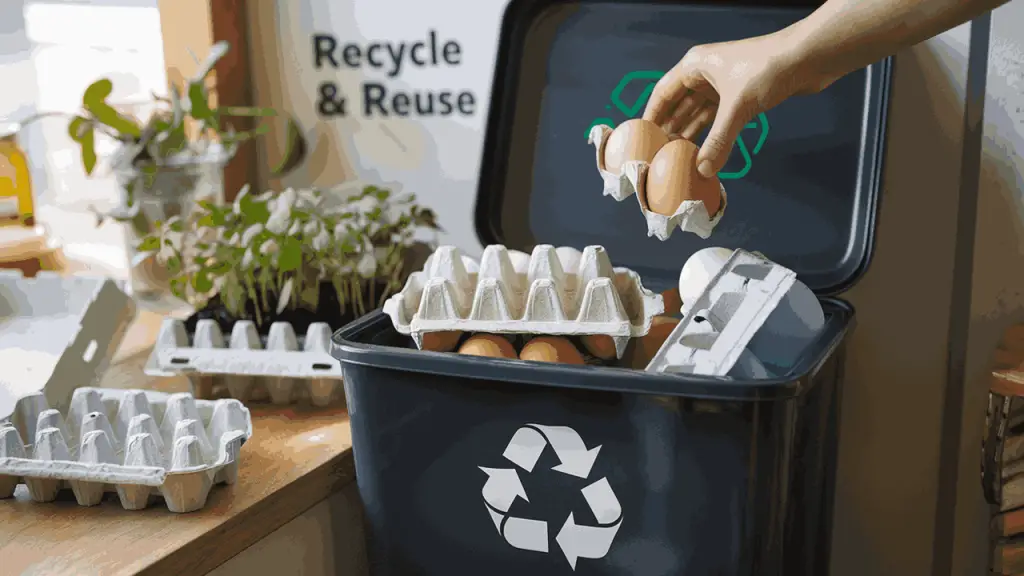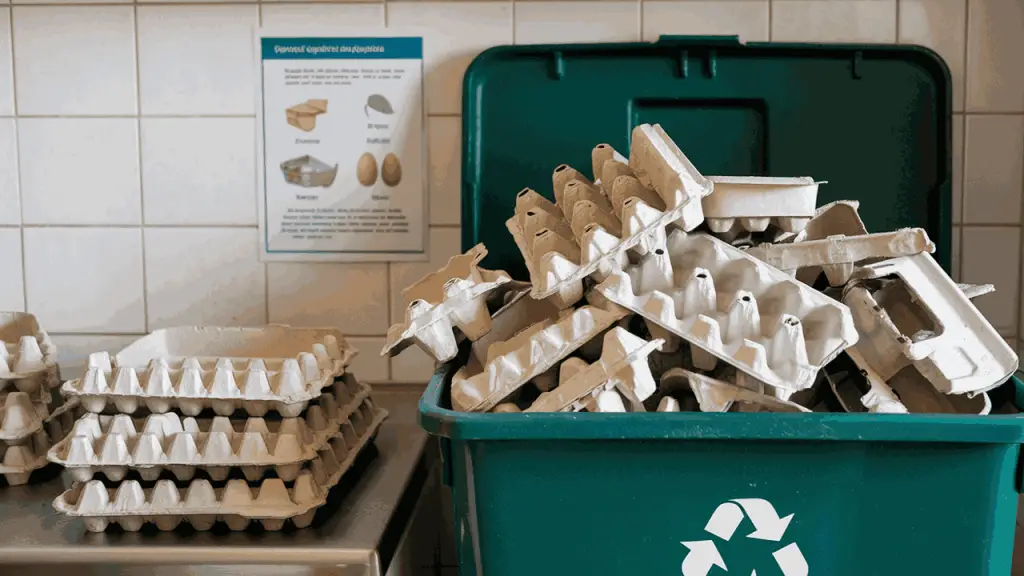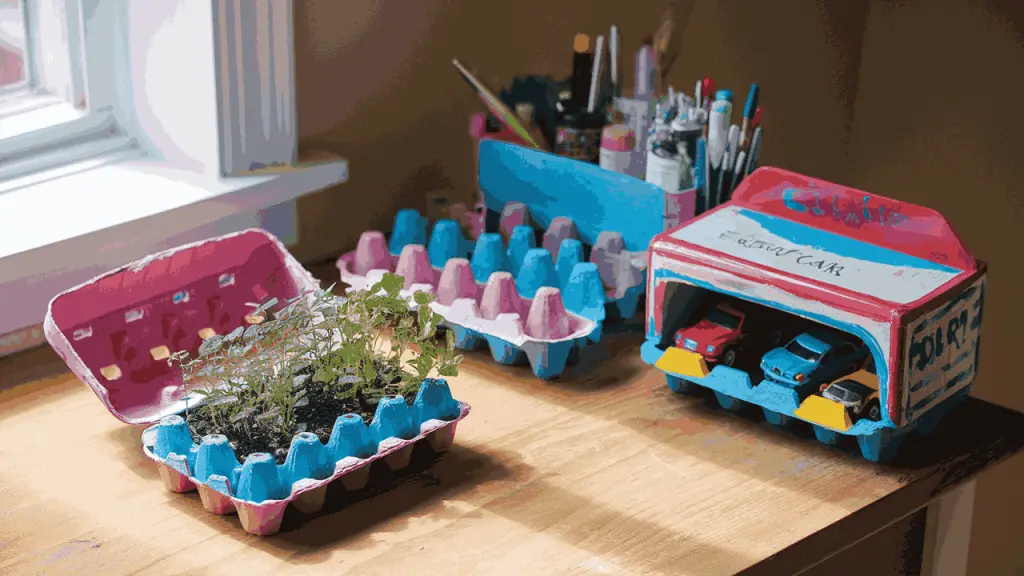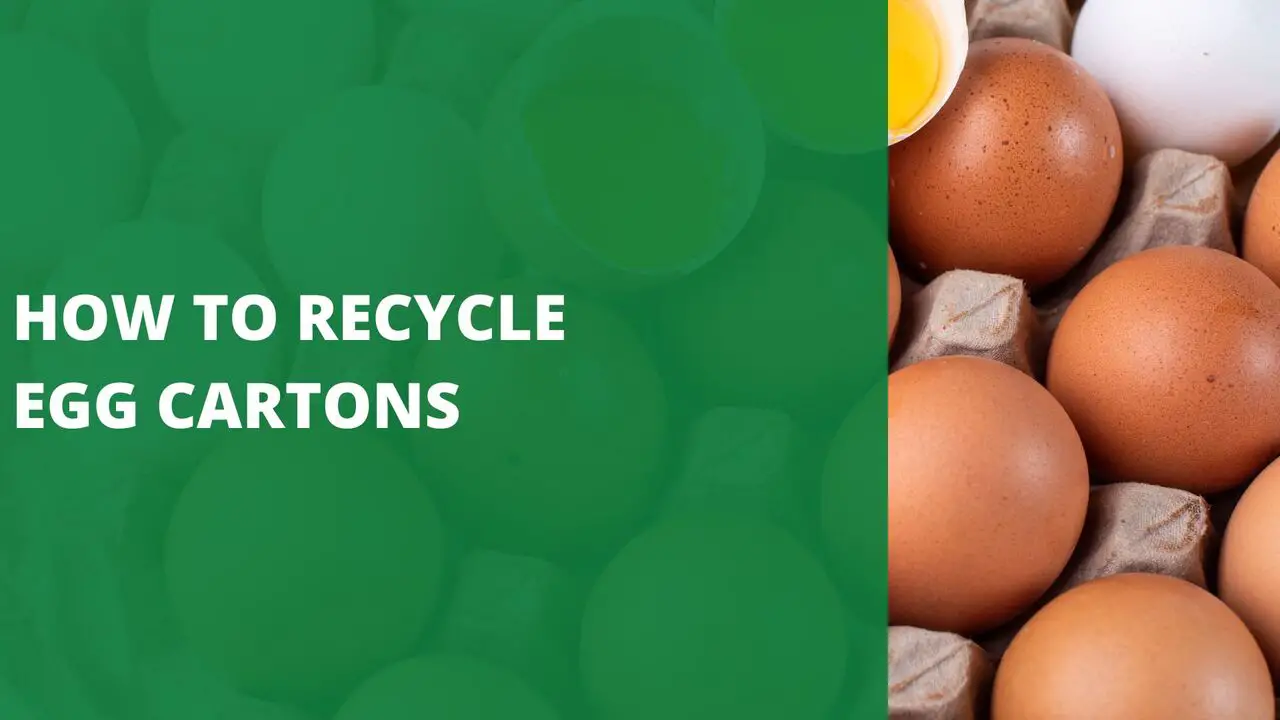Staring at a stack of egg cartons, unsure what to do? These kitchen staples made of paper, plastic, or Styrofoam can be confusing to dispose of. Here are simple, eco-friendly solutions.
In this post, we’ll break it all down for you. Here’s what you’ll get:
- Which cartons can be recycled
- How to recycle or compost them right
- Ideas to reuse them
- What each material means for the planet
- How communities are tackling waste
Types of Egg Cartons and Their Recyclability

A. Paper Egg Cartons: Recyclable with Caveats
You might think paper egg cartons are easily recyclable, but there’s a catch. While made of paper, these cartons often contain short fibers that can weaken the recycled paper’s quality and damage equipment.
Check with your local recycling facility, as some may accept them. If not, consider composting or repurposing them as seed starters for your garden.
B. Plastic Egg Cartons: Generally Recyclable
| Type | Recyclability | Cleaning Required |
| Plastic | Yes | Thorough |
You’ll find that plastic egg cartons, typically made from recycled materials, are generally recyclable. They’re usually classified as plastic #1.
Remember to clean them thoroughly before recycling to prevent contamination. Now that we’ve covered the types of egg cartons, let’s explore proper recycling methods in the next section.
Proper Recycling Methods for Egg Cartons

Understanding the correct recycling procedures is crucial for maximizing the environmental benefits of your efforts.
A. Curbside Pickup: Most Common Method
Curbside pickup is the most convenient and widely available option for recycling egg cartons. Here’s what you need to know
- Check for the recycling symbol on your egg cartons to ensure they’re eligible for curbside collection.
- Clean your cartons thoroughly to prevent contamination of the recycling stream.
- Place paper and plastic egg cartons in your regular recycling bin for collection.
Remember, not all municipalities accept egg cartons in curbside programs, so it’s essential to verify with your local recycling service.
B. Local Grocery Stores and Farms: Take-back Programs
Many grocery stores and farms offer take-back programs for egg cartons, providing an excellent alternative to curbside recycling:
- Return clean, undamaged cartons to participating stores or farms.
- These programs often reuse the cartons, reducing waste and benefiting local farmers.
- Some stores may have collection bins specifically for egg cartons.
| Benefits of Take-back Programs |
| 1. Reduces waste |
| 2. Supports local farmers |
| 3. Promotes circular economy |
| 4. Convenient drop-off option |
C. Designated Drop-off Locations: For Special Materials
For egg cartons made from materials not accepted in curbside programs, such as Styrofoam, designated drop-off locations are your best option:
- Research local recycling centers that accept Styrofoam or polystyrene egg cartons. Use online platforms like Earth911 to locate nearby recycling facilities that accept Styrofoam.
- Some grocery stores may have special collection points for these materials.
- Use these locations for foam cartons, as they’re often not recyclable through regular means.
Utilizing these proper recycling methods, you’re contributing to a more sustainable future. Remember, the key to effective recycling is ensuring your egg cartons are clean and free from residue.
With this in mind, next, we’ll explore how to prepare your egg cartons for recycling, ensuring they’re in the best condition for processing.
Preparing Egg Cartons for Recycling
A. Check for Recycling Symbol
First, check for the recycling symbol on your egg cartons. This symbol typically a triangle made of arrows, indicates recyclability. Look for numbers inside the triangle, which represent different types of recyclable materials:
| Number | Material Type |
| 1 | PET |
| 2 | HDPE |
| 4 | LDPE |
| 5 | PP |
B. Clean Thoroughly to Prevent Contamination
After identifying recyclable cartons, you’ll need to clean them thoroughly. This step is crucial to prevent contamination of other recyclables. Here’s how:
- Remove any remaining eggshells or residue
- Rinse the carton with cool water
- Let it air dry completely
Next, we’ll explore alternative uses for egg cartons that can’t be recycled.
Alternative Uses for Egg Cartons

A. Composting: For Paper and Some Plastic Cartons
Cardboard egg cartons can be composted, adding valuable carbon to your compost pile. Shred them first for faster decomposition.
B. Seed Starters: Creative Gardening Solution
Transform egg cartons into mini greenhouses:
- Add drainage holes
- Fill with seed-starting mix
- Plant seeds
- Keep moist until germination
C. Storage and Crafts: Practical Household Uses
| Use | Description |
| Organizer | Store small items like craft supplies or hardware |
| Paint Palette | Perfect for holding different paint colors |
| Fire Starter | Fill with dryer lint and wax for easy fire starters |
Environmental Impact of Different Egg Carton Materials
Now that we’ve explored alternative uses for egg cartons, let’s explore their environmental impact. You’ll find that different materials have varying effects on our planet:
A. Paper: Most Eco-Friendly Option
Paper egg cartons are biodegradable and have a lower carbon footprint. You can compost them, adding carbon-rich material to your soil. They decompose in 2-4 weeks under optimal conditions.
B. Plastic: Recyclable but Less Sustainable
While recyclable, plastic cartons have a higher environmental impact than paper. You should note that they don’t biodegrade and contribute to pollution if not properly recycled.
C. Styrofoam: Least Environmentally Friendly
Styrofoam cartons pose the greatest environmental challenge. You’ll find they’re difficult to recycle and have a significant ecological footprint.
| Material | Recyclability | Biodegradability | Carbon Footprint |
| Paper | High | Yes | Low |
| Plastic | Medium | No | Medium |
| Styrofoam | Low | No | High |
With this understanding of environmental impacts, you’ll be better prepared to tackle the challenges in egg carton recycling, which we’ll explore next.
Challenges in Egg Carton Recycling
A. Fiber Quality: Issue with Paper Cartons
You might encounter difficulties recycling paper egg cartons due to fiber quality issues. When paper fibers break down during recycling, it affects the overall quality of recycled materials.
B. Local Recycling Capabilities: Vary by Region
Your ability to recycle egg cartons depends on your location. Local recycling facilities may have different capabilities and acceptance policies for various materials:
| Material | Recyclability |
| Paper | Generally accepted |
| Plastic | Varies by region |
| Styrofoam | Often not recyclable |
C. Contamination: Impact on Recycling Process
You should be aware that contamination can significantly hinder the recycling process. Food residue on egg cartons can contaminate entire batches of recyclable materials, making proper cleaning essential before disposal.
Community Initiatives and Legislative Efforts
A. Zero Waste Solutions: Emerging Trends
Now that we’ve covered the challenges in egg carton recycling, let’s explore innovative solutions. You’ll find that communities are embracing zero waste initiatives to tackle these issues. Some emerging trends include:
- Biodegradable egg cartons made from grass fibers
- Digital tracking technologies for enhanced recycling transparency
- Partnerships with retailers to boost consumer participation
B. Local Farm Support: Encouraging Carton Returns
Your local farms play a crucial role in sustainable egg packaging. You can support these efforts by:
- Returning egg cartons to chicken owners for reuse
- Participating in farm-initiated carton collection programs
- Advocating for legislative support of local farm recycling initiatives
| Action | Benefit |
| Return cartons | Reduces waste |
| Support programs | Strengthens community |
| Advocate | Drives policy change |
Conclusion
Recycling egg cartons might seem like a little thing, but it really helps cut down waste and keep our planet happy. Stick with paper cartons they’re the eco-friendly pick and try to skip the Styrofoam ones.
Don’t just chuck them, compost them or whip up a fun craft instead. Peek at your local recycling rules and join in on community efforts; it all adds up. For more tips on recycling other household items, check out our guide on Can You Recycle Wrapping Paper and How to.
Every choice you make, from grabbing eggs at the store to tossing the carton, counts.

